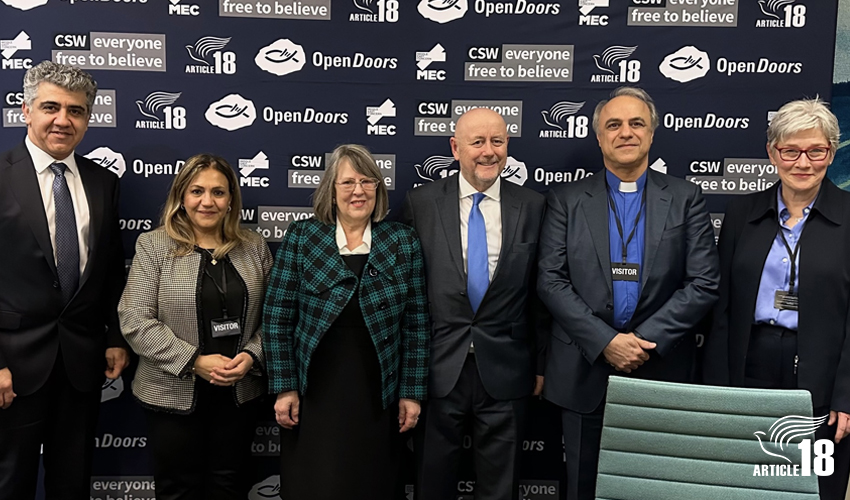
Left to right: Mansour Borji, Shahnaz Jizan, Fiona Bruce MP, Mervyn Thomas, Rev Farhad Sabokrooh, Henrietta Blyth
Article18’s joint annual report – published in collaboration with CSW, Open Doors and Middle East Concern – was presented at the UK parliament last week in an event hosted by the UK PM’s Special Envoy on Freedom of Religion or Belief (FoRB), Fiona Bruce MP.
The primary contributions of the speakers are outlined below, including speeches from CSW’s Mervyn Thomas, Middle East Concern’s Daniel Hoffman, and witnesses Rev Farhad Sabokrooh and wife Shahnaz Jizan, who led a church in Iran for 25 years until their arrest, imprisonment and the church’s forcible closure.
Fiona Bruce MP
The 20 February event began with an introduction from Special Envoy Fiona Bruce MP, who said she was “delighted to be able to play my part in highlighting this report”, produced by four organisations “dedicated to protecting and promoting freedom of religion or belief, particularly for Christians around the world”.
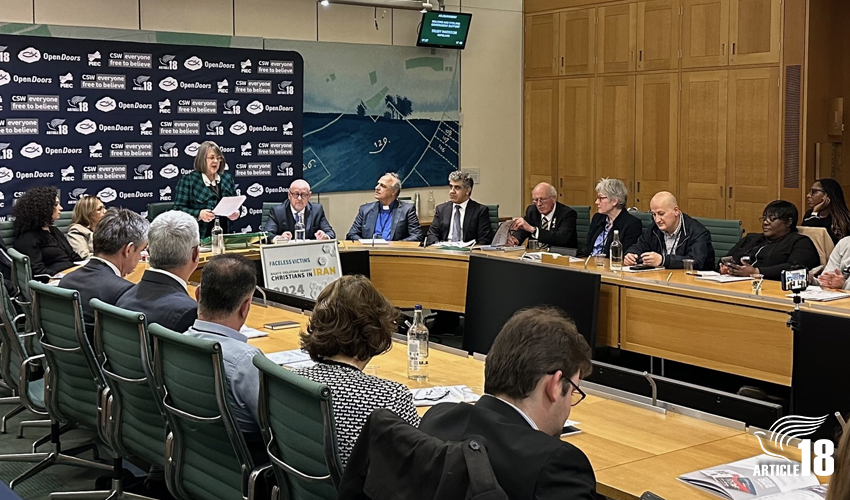
Daniel Hoffman
Middle East Concern’s Daniel Hoffman began his speech by stating: “Iran is a repressive country and I don’t think anyone is surprised to hear that.
“Since its inception, the regime in Iran has been repressing and violating the rights of anyone in any community that they feel is a threat to their [the regime’s] own survival, or to the kind of society that they want to establish.”
Christians, Mr Hoffman said, are “just one of those communities” and “unfortunately there are many groups like them”.
He added that the aim of the 2024 report had been to highlight “the wide range of human rights violations” endured by the Christian community in Iran, and not only of FoRB.
Mr Hoffman noted how the report highlights 11 articles of the International Covenant on Civil and Political Rights (ICCPR) which are contravened by the Iranian authorities, including the rights to privacy, freedom of expression, peaceful assembly, a fair trial, and to protection from arbitrary arrest and detention, torture and cruel or degrading treatment.
“So there is a wide variety of abuses and human rights violations that the Christian community faces,” he said, “and it’s not just limited to specifically religious freedom. So I want to encourage everyone to read the report, and you will much better informed about what is the situation of Christians in Iran.
“And especially for the members of parliament among us, you will not just be better informed, but you will be inspired to act as well, to follow up some of the recommendations mentioned in the report and do what you can to bring positive changes for the Christian community.”
Mervyn Thomas
CSW’s Mervyn Thomas said the report was “a great example of agencies working together” on the issue of FoRB, which “I always think is more powerful”.
He referred again to the ICCPR, noting how Iran ratified the covenant in 1975, but has committed numerous violations since, including several others not mentioned in the report – for example the use of live ammunition against unarmed protesters, the “sharp spike” in the enforcement of the death penalty, and “credible reports of sexual and gender-based violence by security personnel, particularly members of the Islamic Revolutionary Guard Corps”.
Mr Thomas explained how during an interactive dialogue with the UN Special Rapporteur on FoRB last year, the Iranian delegation had said they “respected and protected FoRB for all”, “embraced tolerance and diversity”, and “even emphasised the need to ensure everyone can practice their religion or belief without fear of persecution or prejudice”.
“I think if you read this very well researched report, you’ll find that that is nonsense,” he said. “Our report clearly shows that this pronouncement could not be further from reality.”
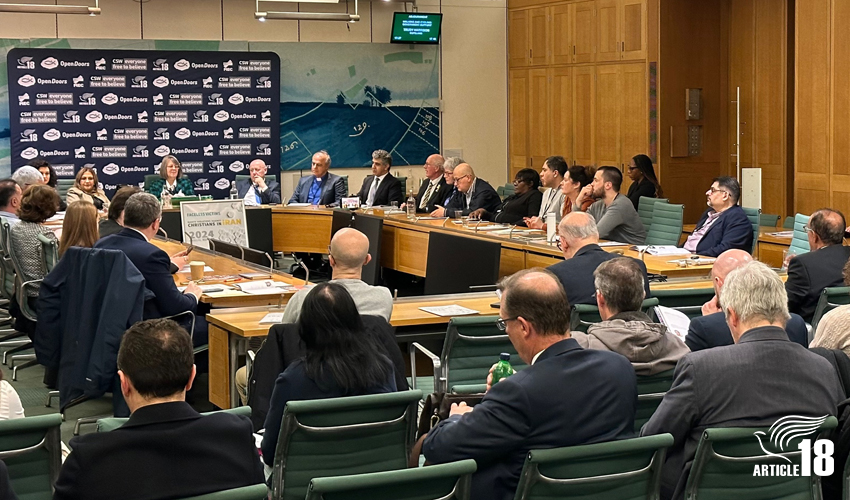
Mr Thomas noted how Christians continue to be charged with “unsubstantiated ‘national-security’-related crimes, which along with penalties for taking Communion wine, or gathering for prayer, or Christmas celebrations, or even a picnic, effectively criminalises normal Christian practice and social activities”.
“These violations and abuses are part of a campaign of repression has been ongoing, with varying degrees of intensity ever since the 1979 revolution,” he said, adding that the “sustained campaign has forced many Christians to flee their country”.
He highlighted the plight of Iranian refugees and asylum-seekers in Turkey, “increasingly under the threat of refoulement”.
“At least 200 were returned forcibly to Iran last year,” he said. “They are routinely detained arbitrarily and some have experienced mistreatment prior to be forcibly returned in violation of international law.
“So we appeal to the UK authorities and other key members of the international communities to make urgent representations to the Turkish authorities to ensure an end to the forced return of these vulnerable individuals, who will certainly face mistreatment and imprisonment.
“Additionally, Iran must be held accountable for its continuing failure to fulfil international commitments which it entered into freely, and to ensure that perpetrators of torture, physical and/or sexual violence against detainees are brought to justice.
“Iran must also bring its domestic laws and practices into conformity with its international obligations to enact the UN standard minimum rules for the treatment of prisoners, and to end the use of fast track and Revolutionary Courts, which lack due process and issue excessive sentences.
“Furthermore, pressure should be exerted to ensure a halt to executions and a moratorium on the death sentence. We must all persist in calling for the immediate, unconditional release of all who remain in prison on account of their religion or belief, along with everyone who is currently detained arbitrarily.
“Finally, Iran must be encouraged to transform their dreamland of tolerance and inclusivity that its UN delegation spoke of last year at the UN Human Rights Council into a reality by promoting, protecting and fulfilling the right to FoRB for every religious and belief community within its borders.”
Rev Farhad Sabokrooh
Rev Sabokrooh explained how “although our church was officially registered, the government of the Islamic Republic did not allow us to have a normal church building, so for many years we gathered for worship and church services in our private homes, with the permission of the Iranian intelligence ministry”.
But “despite that, they never stopped harassing, summoning and interrogating us”.
Rev Sabokrooh said he was arrested three times by intelligence agents, and “each time I was strongly pressured to collaborate with them in spying on churches and giving them information about other pastors. I was threatened that they would stop my ministry and close our worship services”.
The pastor then recalled how, during a service at Christmas 2011, “about 40 agents, all of whom were armed, and some carried video cameras, climbed and jumped over the wall to our house, where the church meeting was held.
“You can imagine: women, children, all of those who have gathered with joy and excitement to participate in a celebration of the birth of Jesus Christ, and the fear and horror that they faced and these masked agents have caused them so much terror.”
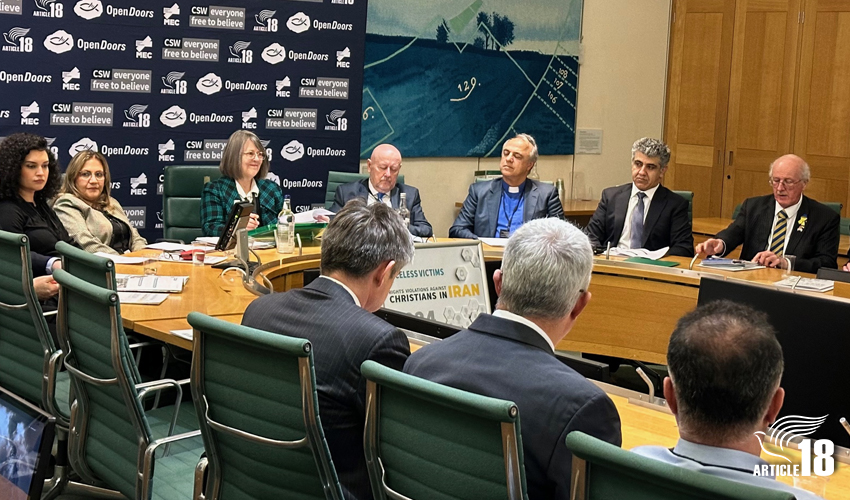
Rev Sabokrooh described how the officers confiscated all mobile phones, as well as his Bible and other books, before transporting them to a Revolutionary Court on “buses they had prepared in advance”.
“The children – about 20 of them – were extremely anxious and scared,” he said. “They treated the ladies in the ruthless way, and disrespected them, even separating young children from their parents.”
Rev Sabokrooh and his wife were then “transferred to an underground detention centre, where they put us in small, cramped cell, isolated and separated from each other”.
“I was under intensive interrogations for 25 days, interrogation sessions which sometimes lasted from 8am to 11pm,” he said.
“The interrogators pressured me to make false confessions. They said the interrogations would continue until I wrote down what they wanted me to.
“They made a series of allegations against us, none of which was true – from being spies of Israel and the United States to being responsible for the spread of ‘Zionist’ Christianity, acting against national security, and insulting Islam.
“In the end, under pressure, they forced me to confess to what they had dictated whilst filming the forced confession.”
Rev Sabokrooh said he was finally released on bail equivalent to around $250,000 after 35 days’ detention.
He added that their lawyer – “a very respectable lady” – was treated “extremely inhumanely”, and eventually “forced to give up representation us”.
“Ultimately,” he said, “in a court session where our lawyer was not allowed to attend, and not lasting more than 10 minutes, we were sentenced to one year in prison.”
After serving this sentence, Rev Sabokrooh said they were told by Ministry of Intelligence officers they had “only one month to leave Iran; otherwise, we cannot guarantee that you will live”.
They fled to Turkey as refugees, and Rev Sabokrooh said: “When we left Iran, we left our lives and everything that we had built together over the years.”
He said their experiences were “just one example of the atrocities that have been committed against Christians and other religious minorities in Iran during the past 45 years”, before concluding:
“My request and plea to you is to hold the Iranian government accountable and make them responsible for respecting the basic rights of Christians and other religious minorities.”
Shahnaz Jizan
Mrs Jizan said their 25 years of serving their church community in Iran were “always accompanied by fear, anxiety and stress”.
“In all those years, we endured many hardships, and my biggest worry was always for my husband and kids because every time they left home, I didn’t know if they would come back home,” she said.
“Worrying about the possibility of the children being kidnapped or the possibility of my husband being assassinated, our phones being tapped, and the use of listening devices in the house, monitoring our movements and even controlling those who came to visit us in our home was only a part of our ongoing struggles.
“I cannot forget the suspicious phone calls that were always made to us. And the constant presence of a car with two passengers parked near our house, where they wrote down the licence plate numbers of every car belonging to people who came to our house. And taking pictures of our guests.
“We were even threatened that if we don’t cooperate with the government, they can easily send weapons and drugs into our house and arrest us for having drugs and weapons.”
Mrs Jizan added that her children “were pressured by their teachers to attend Quranic classes and to read their religious books”.
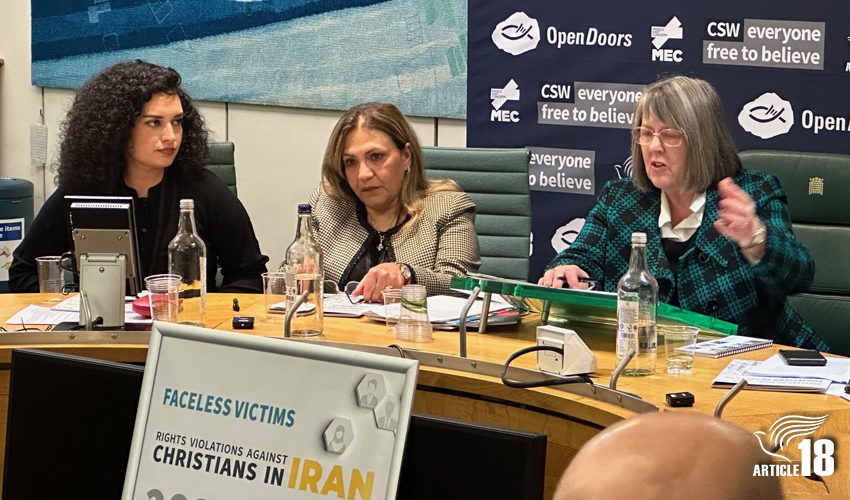
“We faced new problems every day,” she said, “and our stress and worries were passed on to our children. We sensed persecution and harassment with our whole being and lived with those conditions for years.”
Mrs Jizan said the Iranian authorities “considered all our normal church activities conducted in the Persian language as criminal and illegal”. Nevertheless, she said the Christmas 2011 raid was “a great shock to us all”.
“They treated everyone, especially women, very violently and disrespectfully,” she said. “A woman who was pregnant passed out due to stress, and we were not allowed to take her to the hospital. Children were crying out of fear and horror.”
Mrs Jizan explained how when she protested about the officers’ behaviour, “one of the officers attacked me with his gun and my son reacted to protect me, which led to a fight with my son and him being severely beaten”.
During her subsequent detention, Mrs Jizan said she “felt anxiety with my whole being. All my moments were full of stress and horror. I always ask myself: for what crime were we persecuted in such a way and taken away from our children?”
Mrs Jizan later found out that her son and daughter had been summoned to the offices of the Ministry of Intelligence every day of her detention, “and interrogated for hours and only allowed to go home at night”.
“Repetition of this process of interrogation so many times caused our daughter to fall ill and the doctor to prescribe her pills to cope with her severe nervous tension,” she said. “More than 10 years on she still carries the effects of that trauma, which has not disappeared. This issue stopped my daughter studying at university.”
When their sentences were pronounced, Mrs Jizan said it “led to a severe shock in my body and I had to undergo surgery before serving the prison sentence.
“Even though we have been out of Iran for about 10 years, the effects of those hard days are still like a whip on my body and mind. I still have nightmares about my days in prison and the interrogations.”
Mrs Jizan added that their eldest son “has been living as a refugee in Turkey for 10 years, and has not yet been able to join us [in America]. His life and his future has been somehow affected by all this”.
She concluded by asking the British government “to hold the Islamic Republic of Iran responsible and accountable for the oppressive pressure they have placed on the Christians of Iran” and “to demand them to respect their basic rights”.
Q&A
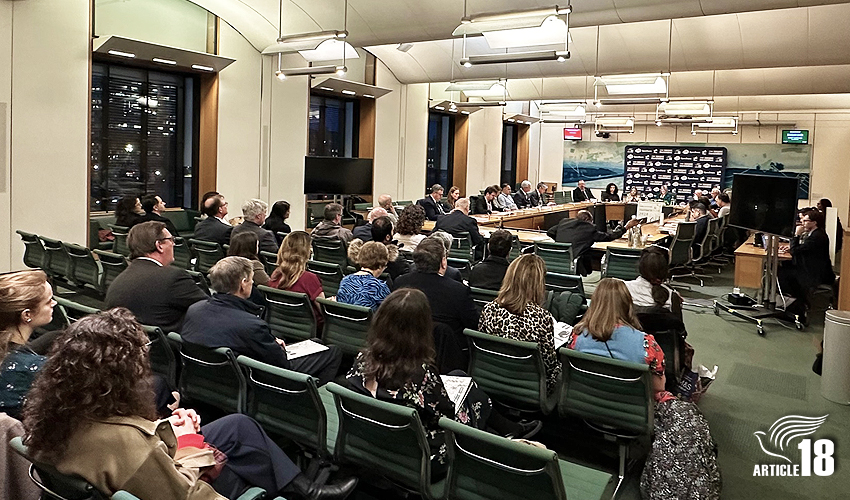
The first contribution from the audience came from MP Jim Shannon, who tearfully acknowledged that the report made for “really hard reading”, asked what parliamentarians could do, and promised to do “all I can” to help Christians in Iran, for whom he said “I pray often and fervently”.
Rev Sabokrooh responded: “First of all, make the Iranian government know that those who are persecuted are seen and heard and hold them accountable, because when they commit atrocities and there is no reaction and response from the international community, they feel they have a sense of impunity to carry on.
“They somehow feel that Christians and other religious minorities are orphans and that they have no-one to protect them,” Rev Sabokrooh added, “and we have to reverse that.
“And my other recommendation is to take FoRB violations just as seriously as gender equality or any other issue of importance.”
Lord Walney said the testimonies and examples in the report had been very “powerful” and asked whether, given the bleak situation, there was “anything which gives you hope?”
“I have been doing this for a very long while,” responded Mervyn Thomas, “and there is more awareness at the political level about these things than there’s ever been, and that gives me hope.
“These things don’t happen overnight, but from my perspective there’s more hope than there’s been for a long while, but the situation is as bad as it’s ever been, if not worse.”
Sammy Wilson MP said “this regime seems to be immune to condemnation; it’s water off a duck’s back,” and asked: “Are there specific ministries or individuals [in Iran] that you believe the message can be driven home to by specific sanctions being imposed by our government? To drive the message home to them that, ‘You can’t act with impunity. You cannot take away people’s rights in the way you’ve done’.”
Article18’s Mansour Borji responded by saying the Iranian authorities “do respond to negative publicity and want to be a player on the world stage, and that’s why they had a 30-member delegation at the UN Human Rights Council to defend their adherence to the ICCPR in October.
“And it shows that they do care and they want to stay in the international arena. And that’s why it’s important when, for example, the All-Party Parliamentary Group on FoRB adopts a prisoner of conscience and raises awareness about them. They don’t want the negative publicity.”
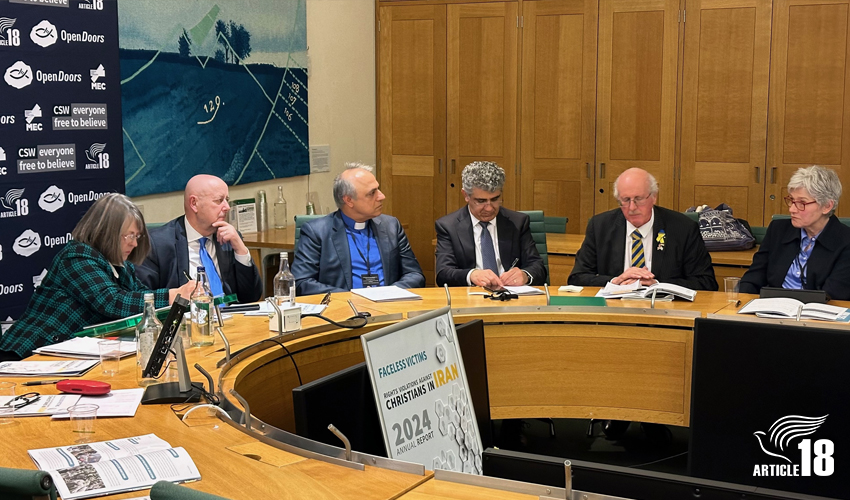
Mr Borji added: “There are multiple ways of keeping them accountable – for example sanctions on judges and officials who are responsible for condemning Christians to long imprisonment.”
He also said more could be done to help Iranian Christian refugees in Turkey like Mojtaba Keshavarz Ahmadi, “who faces a three-year sentence in Iran” if the threat of his deportation is carried out.
Next, journalist Sonja Dahlmans asked whether Mrs Jizan’s interrogators had been male or female.
“All the interrogators were male,” Mrs Jizan responded. “When I was taken into the interrogation room, there was a newspaper they would hold out. They would hold one end and I would hold the other, and they would take me into interrogation. And there were sometimes three male interrogators, and there was no woman there.”
“It’s very clear that women are doubly vulnerable, both for their faith and for their gender,” commented Open Doors’ Henrietta Blyth.
Finally, journalist Bess Twiston-Davies from The Tablet asked the witnesses: “When you were in prison and going through this terrible time, were there particular passages of Scripture that helped you and, if so, why?”
“I felt comforted knowing that Jesus Christ went through a similar experience,” Rev Sabokrooh said. “It was a great comfort to know that if we endured that pressure and I am privileged to share the similar experience.
“So every time my interrogation session was finished, I would kneel down and pray for my interrogator and for their family, that the Lord would open up their eyes that they would see the truth.”
“I know that the persecution was not specific to us,” he said, “but throughout the ages, many Christians have suffered persecution. Persecution has been, is, and will continue to be.”
Jim Shannon said Rev Sabokrooh’s response reminded him of Hebrews 12: “Consider Him who endured such opposition so that you will not grow weary and lose heart.”
Fiona Bruce MP referenced Isaiah 58: “If you spend yourself on behalf of the hungry, then the Lord will answer. If you remove the heavy yoke of oppression, then your light will shine out in the darkness and the darkness around you will be as bright as noon. The Lord will guide you continually, giving you water when you are dry, restoring your strength. You will be like a well-watered garden, like an ever-flowing spring.”
“It is a wonderful promise that as we seek to serve the Lord, He will renew our strength like the eagles,” she said.
“The report’s called ‘Faceless Victims’,” said Sammy Wilson MP. “They might be faceless, but their names are known to the Lord.”
Rev Edward Hovsepian, brother of murdered pastor Haik Hovsepian, closed the meeting with a prayer.
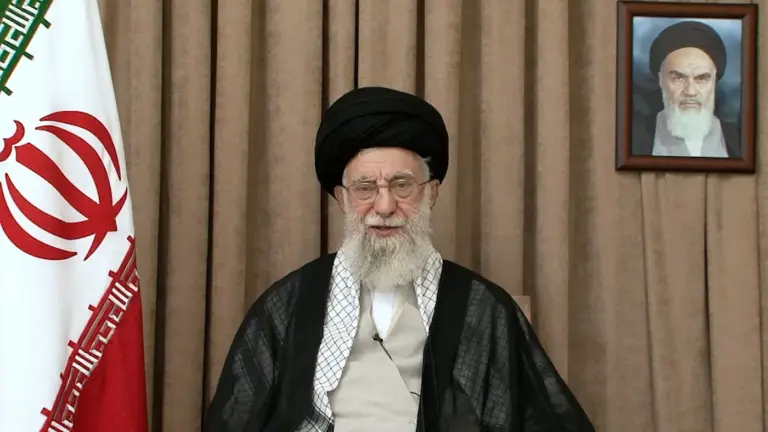
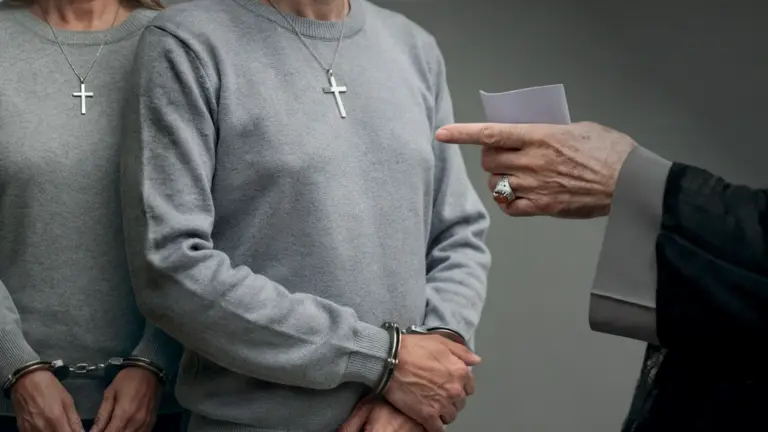
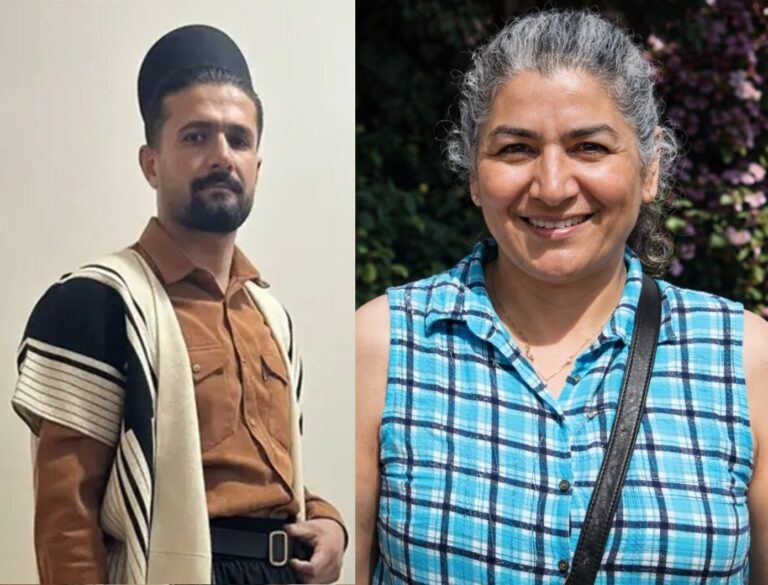
0 Comments